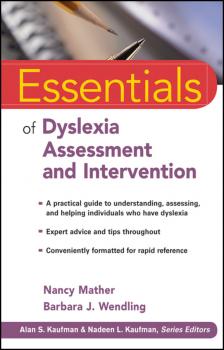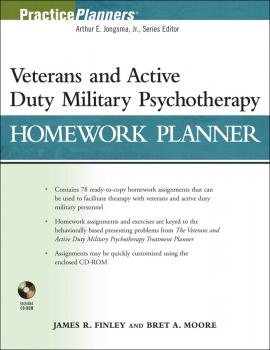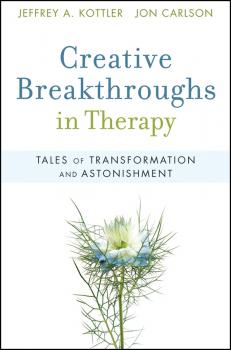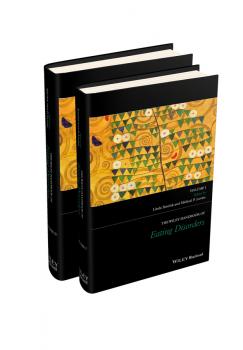ТОП просматриваемых книг сайта:
Общая психология
Различные книги в жанре Общая психология, доступные для чтения и скачиванияАннотация
Quickly acquire the knowledge and skills you need to effectively understand, assess, and treat individuals struggling with dyslexia Essentials of Dyslexia Assessment and Intervention provides practical, step-by-step information on accurately identifying, assessing, and using evidence-based interventions with individuals with dyslexia. Addressing the components that need to be considered in the assessment of dyslexia—both cognitive and academic—this book includes descriptions of the various tests used in a comprehensive dyslexia assessment along with detailed, evidence-based interventions that professionals and parents can use to help individuals struggling with dyslexia. Like all the volumes in the Essentials of Psychological Assessment series, each concise chapter features numerous callout boxes highlighting key concepts, bulleted points, and extensive illustrative material, as well as test questions that help you gauge and reinforce your grasp of the information covered. Providing an in-depth look at dyslexia, this straightforward book presents information that will prepare school psychologists, neuropsychologists, educational diagnosticians, special education teachers, as well as general education teachers, to recognize, assess, and provide effective treatment programs for dyslexia. The book is also a good resource for parents who are helping a child with dyslexia. A practical guide to understanding, assessing, and helping individuals who have dyslexia Expert advice and tips throughout Conveniently formatted for rapid reference Other titles in the Essentials of Psychological Assessment series: Essentials of Assessment Report Writing Essentials of School Neuropsychological Assessment Essentials of Evidence-Based Academic Interventions Essentials of Response to Intervention Essentials of Processing Assessment Essentials of Conners Behavior Assessments Essentials of Cross-Battery Assessment, Second Edition Essentials of WISC-IV Assessment, Second Edition
Аннотация
Features assignments and exercises to meet the changing needsof mental health professionals The Veterans and Active Duty Military Psychotherapy Homework Planner provides you with an array of ready-to-use, between-session assignments designed to fit virtually every therapeutic mode. This easy-to-use sourcebook features: 78 ready-to-copy exercises covering the most common issues encountered by veterans and active duty soldiers in therapy, such as anger management, substance abuse and dependence, bereavement, pre-deployment stress, and chronic pain after injury A quick-reference format—the interactive assignments are grouped by behavioral problems including combat and operational stress reactions, postdeployment reintegration, survivor's guilt, anxiety, parenting problems related to deployment, and posttraumatic stress disorder Expert guidance on how and when to make the most efficient use of the exercises Assignments are cross-referenced to The Veterans and Active Duty Military Psychotherapy Treatment Planner—so you can quickly identify the right exercise for a given situation or problem A CD-ROM that contains all the exercises in a word-processing format—allowing you to customize them to suit you and your clients' unique styles and needs
Аннотация
Die Autorin zeigt, wie Kopersprache wahrgenommen wird und welche unterschiedlichen Formen der Korpersprache es gibt (Gesten, Bewegungen etc.), wie sie eingesetzt werden und was sie bedeuten. Buchstablich von Kopf bis Fu? >ubersetzt< sie dann die Korpersprache. Angefangen mit der erhobenen Augenbraue bis zum wippenden Fu? erklart Elizabeth Kuhnke, was die Korpersprache unseres Gegenubers sagt und was unsere Korpersprache uber uns sagt. Dabei erlautert sie, wie der Einsatz von Requisiten (Brille, Schlussel, Kuli etc.) die Korpersprache noch unterstutzt. Sie erfahren die Bedeutung des raumlichen Abstands (>Bannmeile< und deren Uberschreitung) und erhalten Tipps fur die richtige Korpersprache beim Flirten oder im Vorstellungsgesprach. Ein Kapitel ist dem Verstandnis der Korpersprache anderer Kulturkreise gewidmet.
Comprehensive Evaluations. Case Reports for Psychologists, Diagnosticians, and Special Educators - Mather Nancy
Аннотация
An invaluable collection of sample case reports from experts in child and adolescent assessment With contributions from authorities in the fields of psychology and special education-including Dawn Flanagan, Elaine Fletcher-Janzen, Randy Kamphaus, Nadeen Kaufman, George McCloskey, Jack Naglieri, Cecil Reynolds, and Gale Roid—Comprehensive Evaluations provides over fifty sample case reports to help you draft carefully planned, goal-directed, and comprehensive evaluations that clearly explain the reasons for a student's school-related difficulties, from preschool to postsecondary level. A wellspring of information for educational professionals, Comprehensive Evaluations provides models for writing diagnostic reports to accompany the tests most frequently administered in the evaluation of children, adolescents, and adults, including the BASC-2, KABC-II, WAIS-IV, WISC-IV, and WJ III. The reports reflect various disciplines within psychology and education, different theoretical perspectives and paradigms, and span a broad spectrum of disabilities. The diagnostic reports found within Comprehensive Evaluations will help: Expand your familiarity with widely used test instruments Enhance your understanding of the interpretation of test scores Improve your ability to tailor written reports to the purposes of the evaluation Translate assessment results into meaningful treatment recommendations Recognize the differences in what evaluators from various school districts, agencies, and private practices consider to be a comprehensive evaluation Appreciate how your theoretical perspective and choice of tests can influence diagnostic conclusions Determine a report writing style that meets your needs Comprehensive Evaluations deftly illustrates how thorough assessments help empirically pinpoint the reasons a student is struggling in school, which then allows an evaluator to select the most appropriate accommodations and interventions to help the student succeed.
Аннотация
An invitation to observe and achieve transformative breakthroughs in the therapeutic experience Creative Breakthroughs in Therapy: Tales of Transformation and Astonishment brings together nineteen of the world's most prominent and creative therapists and researchers, taking professionals inside each contributor's creative innovations in theory and technique. Designed for all therapists who wish to communicate their therapeutic messages creatively and effectively, authors Jeffrey Kottler and Jon Carlson invite you to be inspired from the observations of your peers and consider how these approaches might be applied to your own work. Drawn from real-life cases, contributors share stories of their most creative breakthroughs, demonstrating out-of-the-box thinking that freed them to create alternative ways of meeting their clients? needs. Creative Breakthroughs in Therapy: Tales of Transformation and Astonishment will motivate you to experiment as an agent of change, exploring new, creative ways to make a difference in people's lives, with wisdom from some of the world?s foremost authorities including: Stephen Lankton, Bradford Keeney, Sam Gladding, Steve Madigan, Michael Yapko, Scott Miller, Jeff Zeig, Judy Jordan, Robert Neimeyer, Laura Brown, Bill O'Hanlon, Cloe Madanes, Len Sperry, Fred Bemak, Nancy McWilliams, Nick Cummings and Alfonso Montuori The stories in this book represent seminal cases in which eminent practitioners in therapy and related fields express their own unique voices as clinicians. The book focuses on what led each clinician to a creative breakthrough and identifies the common variables—across all the stories—that might promote innovation in the future. Their experiences will inspire every therapist to discover their own creative path.
Аннотация
This groundbreaking two-volume handbook provides a comprehensive collection of evidence-based analyses of the causes, treatment, and prevention of eating disorders. A two-volume handbook featuring contributions from an international group of experts, and edited by two of the leading authorities on eating disorders and body image research Presents comprehensive coverage of eating disorders, including their history, etiological factors, diagnosis, assessment, prevention, and treatment Tackles controversies and previously unanswered questions in the field Includes coverage of DSM-5 and suggestions for further research at the end of each chapter 2 Volumes
Аннотация
Quickly acquire the knowledge and skills you need to confidently administer, score, and interpret the NEPSY®-II The NEPSY®-II is widely used by school psychologists, neuropsychologists, and research psychologists to assess children, ages three to sixteen, with neurological disorders and developmental disabilities and to develop effective intervention strategies. It provides comprehensive assessment over six functional domains: Attention/Executive Functioning, Language, Sensorimotor Functions, Visuospatial Processing, Memory and Learning, and Social Perception. Professionals need an authoritative source of advice and guidance on how to administer, score, and interpret the test to use it properly. Coauthored by two of the creators of the NEPSY®-II, Essentials of NEPSY®-II Assessment is that source. Like all the volumes in the Essentials of Psychological Assessment series, this book is designed to help busy mental health professionals, and those in training, quickly acquire the knowledge and skills they need to make optimal use of major psychological assessment instruments. Each concise chapter features numerous callout boxes highlighting key concepts, bulleted points, and extensive illustrative material, as well as test questions that help you gauge and reinforce your grasp of the information covered. Essentials of NEPSY®-II Assessment includes vital information about the NEPSY®-II, including the advantage of being able to assess a child across functions and modalities. The authors provide step-by-step guidance on test administration, scoring, and interpretation and valuable advice on its clinical applications. Expert assessment of the test’s relative strengths and weaknesses is also provided in a chapter contributed by Stephen R. Hooper. Other titles in the Essentials of Psychological Assessment series: Essentials of Assessment Report Writing Essentials of School Neurosychological Assessment Essentials of Evidence-Based Academic Interventions Essentials of Response to Intervention Essentials of Processing Assessment Essentials of Conners Behavior AssessmentsTM Essentials of Cross-Battery Assessment, Second Edition Essentials of WISC®-IV Assessment, Second Edition
Аннотация
Updated to reflect recent changes in the field, the 2nd Edition of Forensic Psychology presents a comprehensive overview of forensic psychology and its applications in the civil and criminal justice systems of the UK. Builds on the first edition to convey material in an engaging manner to postgraduate students in psychology Includes a significant expansion of pedagogical features, including text boxes highlighting key seminar issues and key debates in the field to further group discussion Provides an up-to-date summary of emerging evidence in the field, and its implications for evidence based practice Points to additional online learning resources at the conclusion of each chapter
Filipino American Psychology. A Handbook of Theory, Research, and Clinical Practice - Nadal Kevin L.
Аннотация
Praise for Filipino American Psychology: A Handbook of Theory, Research, and Clinical Practice «Filipino American Psychology: A Handbook of Theory, Research, and Clinical Practice is destined to make a major contribution to the field of Asian American psychology and to the larger field of multicultural psychology.» —From the Foreword by Derald Wing Sue, PhD Professor of Psychology and Education, Teachers College, Columbia University «Dr. Nadal has done a superb job of locating the experiences of Filipino Americans within the larger scholarship on ethnic minority psychology, while also highlighting the complexity, richness, and uniqueness of their psychological experiences. This book should be a part of everyone's library.» —E.J.R. David, PhD Assistant Professor, Department of Psychology, University of Alaska Anchorage «Ranging from historical contexts to present-day case studies, theoretical models to empirical findings, self-reflection activities to online and media resources, Filipino American Psychology will engage, stimulate, and challenge both novices and experts. Without question, Dr. Nadal's book is a foundational text and a one-stop resource for both the Filipino American community and the community of mental health professionals.» —Alvin N. Alvarez, PhD Professor, San Francisco State University A landmark volume exploring contemporary issues affecting Filipino Americans, as well as the most successful mental health strategies for working with Filipino American clients Addressing the mental health needs of the Filipino American population—an often invisible, misunderstood, and forgotten group—Filipino American Psychology provides counselors and other mental health practitioners with the knowledge, awareness, and skills they can use to become effective and culturally competent when working with their Filipino American clients. Filipino American Psychology begins by looking at the unique cultural, social, political, economic, and mental health needs of Filipino Americans. Noted expert—and Filipino American—Kevin Nadal builds on a foundational understanding of the unique role and experience of Filipino Americans, offering strategies for more effective clinical work with Filipino Americans in a variety of settings. A must-read for mental health professionals as well as educators and students in the mental health field, Filipino American Psychology is an insightful look at the Filipino American community and the nuances of the Filipino American psyche.
Аннотация
Practical techniques for guiding parents through the stages of adoption and beyond «This book makes a significant contribution to both a greater understanding of adoption and its complex dynamic constellations as well as to serving those who are or come across adoption families, many of whom count on us adoption-informed mental health professionals to clarify and facilitate the challenges they face.» —From the Foreword by Henri Parens, MD, Professor of Psychiatry, Thomas Jefferson University, Training and Supervising Analyst, Psychoanalytic Center of Philadelphia «What most people don't know about adoption could fill a book—and this is the book. Finally sorting myth from science, Working with Adoptive Parents will give therapists, and quite a few nonprofessionals considering adoption, the real story of what it means to make this momentous choice. Better yet, it does so without letting the data speak in place of the parents themselves, in all their fear, doubt, and joy.» —Jesse Green, author of The Velveteen Father: An Unexpected Journey to Parenthood Editors Virginia Brabender and April Fallon are clinical psychologists and also adoptive parents whose families are acquainted with both the uncertainty and joy of adoption. In Working with Adoptive Parents, they offer an in-depth treatment of the distinctive needs, feelings, impulses, expectations, and conflicts that adoptive parents experience through the stages of adoption and beyond. This volume offers a comprehensive picture of adoption through an exploration of the experiences and developmental processes of the adoptive parent. Featuring contributions from mental health professionals whose careers have focused on work with families through the adoption process, this unique book: Covers the theory, research, and practice of adoptive parenting throughout the life cycle Explores the issues unique to the adoptive mother and adoptive father as they traverse the stages of parenting Offers a close look at families with special needs children Acknowledges and explores the great diversity among adoptive families and the kinship networks in which they are embedded Examines attachment issues between adoptive parent and child Providing a framework for therapists to conceptualize their work with adoptive parents, Working with Adoptive Parents clarifies and facilitates the journey that many of these families face.










